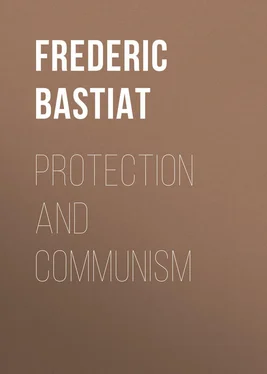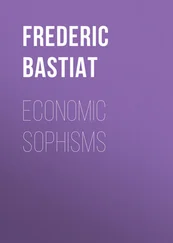Frederic Bastiat - Protection and Communism
Здесь есть возможность читать онлайн «Frederic Bastiat - Protection and Communism» — ознакомительный отрывок электронной книги совершенно бесплатно, а после прочтения отрывка купить полную версию. В некоторых случаях можно слушать аудио, скачать через торрент в формате fb2 и присутствует краткое содержание. ISBN: , Жанр: foreign_antique, foreign_prose, на английском языке. Описание произведения, (предисловие) а так же отзывы посетителей доступны на портале библиотеки ЛибКат.
- Название:Protection and Communism
- Автор:
- Жанр:
- Год:неизвестен
- ISBN:http://www.gutenberg.org/ebooks/44144
- Рейтинг книги:5 / 5. Голосов: 1
-
Избранное:Добавить в избранное
- Отзывы:
-
Ваша оценка:
- 100
- 1
- 2
- 3
- 4
- 5
Protection and Communism: краткое содержание, описание и аннотация
Предлагаем к чтению аннотацию, описание, краткое содержание или предисловие (зависит от того, что написал сам автор книги «Protection and Communism»). Если вы не нашли необходимую информацию о книге — напишите в комментариях, мы постараемся отыскать её.
Protection and Communism — читать онлайн ознакомительный отрывок
Ниже представлен текст книги, разбитый по страницам. Система сохранения места последней прочитанной страницы, позволяет с удобством читать онлайн бесплатно книгу «Protection and Communism», без необходимости каждый раз заново искать на чём Вы остановились. Поставьте закладку, и сможете в любой момент перейти на страницу, на которой закончили чтение.
Интервал:
Закладка:
Frederic Bastiat
Protection and Communism
Sir,
Do not be ungrateful to the revolution of February. It may have surprised, perhaps disturbed you, but it has also afforded you, whether as an author, an orator, or a practised statesman, some unexpected triumphs. Amidst these successes, there is one certainly of no usual character. We not long ago read in La Presse , 'The Association for the Protection of National Labour (the ancient Mimerel Club) 1 1 An association, Mr. Porter informs us, composed like that assembling (or that did assemble, for we are not quite sure whether it still exists,) at No. 17, New Bond Street, exclusively of producers, at least of the article sought to be protected, and therefore of persons who believe themselves to be interested in excluding from the home market the productions of others.
is about to address a circular to all its correspondents, to announce that a subscription is opened for the purpose of promoting in manufactories the circulation of M. Thiers's book upon Property. The association itself subscribes for 5000 copies.' Would that I had been present when this flattering announcement met your eyes. It should have made them sparkle with joy. We have good reason to say that the ways of Providence are as infallible as they are impenetrable. For if you will bear with me for a moment I will endeavour to prove that Protection, when fully developed, and pushed to its legitimate consequences, becomes Communism. It is sufficiently singular that a champion of Protection should discover that he is a promoter of Communism; but what is more extraordinary and more consoling still, is the fact that we find a powerful association, that was formed for the purpose of propagating theoretically and practically the principles of Communism (in the manner deemed most profitable to its members) now devoting the half of its resources to destroy the evil which it has done with the other half.
I repeat it, – this is consoling. It assures us of the inevitable triumph of truth, since it shows us the real and first propagators of subversive doctrines, startled at their success, industriously correcting with the proper antidote the poison they had spread.
This supposes, it is true, the identity of the principles of Communism and of Protection, and perhaps you do not admit this identity, though, to speak the truth, it seems to me impossible that you could have written four hundred pages upon Property without being struck by it. Perhaps you imagine that some efforts made in favour of commercial freedom, or rather of free trade, the impatience of a discussion without results, the ardour of the contest, and the keenness of the struggle, have made me view (what happens too often to all of us) the errors of my adversaries in exaggerated colours. But, beyond question, according to my idea, it requires but little effort to develop the principles you have been advocating into those of Communism. How can it be that our great manufacturers, landed proprietors, rich bankers, able statesmen, have become, without knowing or wishing it, the introducers, the very apostles of Communism in Prance? And why not, I would ask? There are numerous workmen fully convinced of the right of labour , and consequently Communists also without knowing or wishing it, and who would not acknowledge the title. The reason of this is, that amongst all classes interest biases the will, and the will, as Pascal says, is the chief element of our faith. Under another name, many of our working classes, very honest people be it observed, use Communism as they have always used it, namely, on the condition that the wealth of others should alone be liable to the law. But as soon as the principle, extending itself, would apply the same rule to their own property – oh! then Communism is held in detestation, and their former principles are rejected with loathing. To express surprise at this, is simply to confess ignorance of the human heart, its secret workings, and how strong its inclination is to practise self-deception. 2 2 The truth of this is found on all occasions where the interests or the passions of men are concerned, and was rather amusingly shown in many ways when the free-trade measures of Sir R. Peel were being carried through. Then every interest desired free-trade, except with reference to the articles produced by itself.
No, Sir; it is not the heat of controversy, which has betrayed me in seeing the doctrine of Protection in this light, for, on the contrary, it was because I saw it in this point of view before the struggle commenced that I am thus engaged. Believe me that to extend somewhat our foreign commerce – a consequential result which, however, is far from despicable – was never my governing motive; I believed, and I still believe, that property itself was concerned in the question; I believed, and I still believe, that our tariff of customs, owing to the principle which has given it birth, and the arguments by which it is defended, has made a breach in the very principle of property itself, through which all the rest of our legislation threatens to force itself. In considering this state of things, it seems to me that a Communism, the true effect and range of which, (I must say this to be just,) was not contemplated by its supporters, was on the point of overwhelming us. It seems to me that this particular species of Communism (for there are several kinds of it) flows logically from the arguments of the protectionists, and is involved when those arguments are pressed to their legitimate conclusion. It is upon this ground, therefore, that it seems to me of the utmost importance to meet the evil, for, fortified as it is by sophistical statements, and sanctioned by high authority, there is no hope of eradicating the error while such statements are permitted to take possession of and to distract the mind of the public. It is thus that we view the matter at Bordeaux, Paris, Marseilles, Lyons, and elsewhere, where we have organized the free-trade association. Commercial freedom, considered by itself, is without doubt a great blessing to the people; but if we had only this object in view, our body should have been named the Association for Commercial Freedom , or, more accurately, for the Gradual Reform of the Tariffs . But the word 'free-trade' implies the free disposal of the produce of labour , in other terms ' property ' and it is for this reason that we have preferred it. We knew, indeed, that the term would give rise to many difficulties. It affirmed a principle, and from that moment all the supporters of the opposite one ranged themselves against us. More than this, it was extremely objectionable, even to some of those who were the most disposed to second us, that is to say, to merchants and traders more engaged in reforming the Customs than in overthrowing Communism. Havre, while sympathizing with our views, refused to enlist under our banner. On all sides I was told, 'Let us obtain without loss of time some modification of our tariff, without publishing to the world our extreme pretensions.' I replied, 'If you have only that in view, exert your influence through your chambers of commerce.' To this they answered, 'The word free-trade frightens people, and retards our success.' Nothing is more true; but I would derive even from the terror inspired by this word my strongest arguments for its adoption. The more disliked it is, say I, the more it proves that the true notion of property is obscured. The doctrine of Protection has clouded ideas, and confused and false ideas have in their turn supported Protection. To obtain by surprise, or with the consent of the Government, an accidental amelioration of the tariff may modify an effect, but cannot destroy a cause. I retain, then, the word Free-trade , not in the mere spirit of opposition, but still, I admit, because of the obstacles it creates or encounters – obstacles which, while they betray the mischief at work, bear along with them the certain proof, that the very foundation of social order was threatened.
Читать дальшеИнтервал:
Закладка:
Похожие книги на «Protection and Communism»
Представляем Вашему вниманию похожие книги на «Protection and Communism» списком для выбора. Мы отобрали схожую по названию и смыслу литературу в надежде предоставить читателям больше вариантов отыскать новые, интересные, ещё непрочитанные произведения.
Обсуждение, отзывы о книге «Protection and Communism» и просто собственные мнения читателей. Оставьте ваши комментарии, напишите, что Вы думаете о произведении, его смысле или главных героях. Укажите что конкретно понравилось, а что нет, и почему Вы так считаете.












